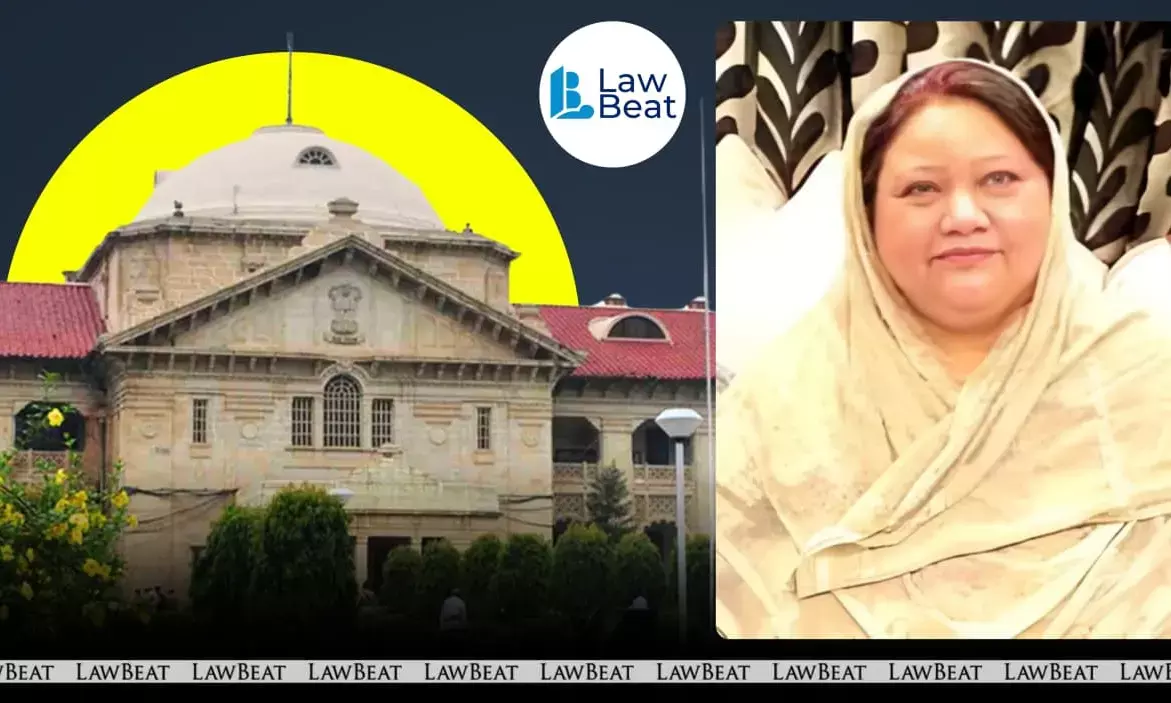Allahabad HC Quashes Trafficking, Bonded Labour Case Against SP MLA’s Wife Seema Beg

The Allahabad High Court quashes charge sheet against Seema Beg in minor domestic worker trafficking, bonded labour case
The Allahabad High Court has quashed the charge sheet and all criminal proceedings against Seema Beg, wife of Samajwadi Party MLA Zahid Jamal Beg, in the case alleging that two minor girls employed as domestic workers in her household were victims of trafficking and bonded labour.
The bench of Justice Sameer Jain, while allowing Beg’s application under Section 528 of the Bharatiya Nagarik Suraksha Sanhita, held that the material collected during investigation did not disclose the legal ingredients necessary to constitute offences under the Bharatiya Nyaya Sanhita (BNS), the Juvenile Justice Act, or the Bonded Labour System (Abolition) Act.
Notably, the high court has stayed the trial proceedings against Zahid and Seema Beg in the minor's suicide case.
An FIR was registered on 13 September 2024 at Bhadohi police station, after a minor girl was found dead under suspicious circumstances at the couple’s home on 9 September 2024. During inquiry, another 15-year-old girl was discovered working there. She was later produced before the Juvenile Welfare Committee and sent to a protection home.
In her statement, the survivor said she and the deceased had been working in the house for about two years, were sometimes scolded or beaten, and that a few days before her death the deceased had expressed a desire to run away. According to the FIR, the deceased was paid Rs. 2,000 per month, taken by her mother, while the other girl was reportedly not paid directly for her work.
A charge sheet dated 21 November 2024 was filed and cognizance taken on 28 November 2024. The couple were accused under Sections 143(4) and 143(5) BNS (trafficking of minors for exploitation), Section 79 of the Juvenile Justice (Care and Protection of Children) Act 2015, and Sections 4 and 16 of the Bonded Labour System (Abolition) Act 1976.
Arguing for Seema Beg, Senior Advocate G.S. Chaturvedi submitted that the allegations were vague and unsupported by evidence. He said both minors had been brought to work with their families’ consent, there was no element of coercion, abduction, deception, abuse of power or inducement, and no proof that the girls were recruited or employed for the purpose of exploitation, a prerequisite under Section 143 BNS. He further pointed out that there was no allegation that their earnings were withheld or used by the employer, ruling out offences under Section 79 of the Juvenile Justice Act or Section 16 of the Bonded Labour Act.
The State, represented by Additional Advocate General Manish Goyal, opposed the plea and argued that both girls were minors, paid insufficiently, and subjected to begar (forced labour), thus constituting exploitation punishable under the constitutional and statutory prohibitions against human trafficking and forced labour.
After examining the investigation material and statutory provisions, court noted that Section 143 BNS criminalises trafficking only when a person is recruited, transported, harboured, transferred or received for the purpose of exploitation through specified means such as threat, force, coercion, abduction, fraud, abuse of power or inducement. It observed that there was no evidence that either of the minors had been recruited or kept under such conditions.
The bench held that while employing minors as domestic help is socially and legally undesirable, criminal liability under the trafficking, juvenile-justice or bonded-labour provisions cannot be imposed unless the statutory ingredients of exploitation or bondage are demonstrated.
“From the material available on record, prima facie, no offence under Section 143 BNS, Section 79 of the Juvenile Justice (Care and Protection of Children) Act, 2015, and Sections 4/16 of the Bonded Labour Act is made out against the applicant,” the court stated.
Relying on judgments including R.P. Kapur v. State of Punjab and State of Haryana v. Bhajan Lal, Justice Jain reiterated that when no prima facie offence is made out from the investigation material, the proceedings are liable to be quashed.
Accordingly, the high court allowed Seema Beg’s application, quashed the charge sheet dated 21 November 2024, the cognizance order dated 28 November 2024, and all proceedings pending against her in the case before the additional sessions judge, Bhadohi.
Case Title: Seema Beg vs State of UP and Another
Order Date: November 7, 2025
Bench: Justice Sameer Jain
